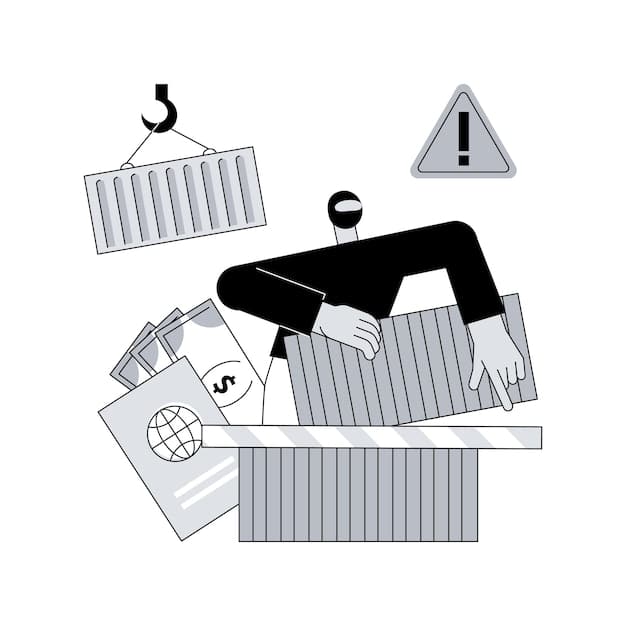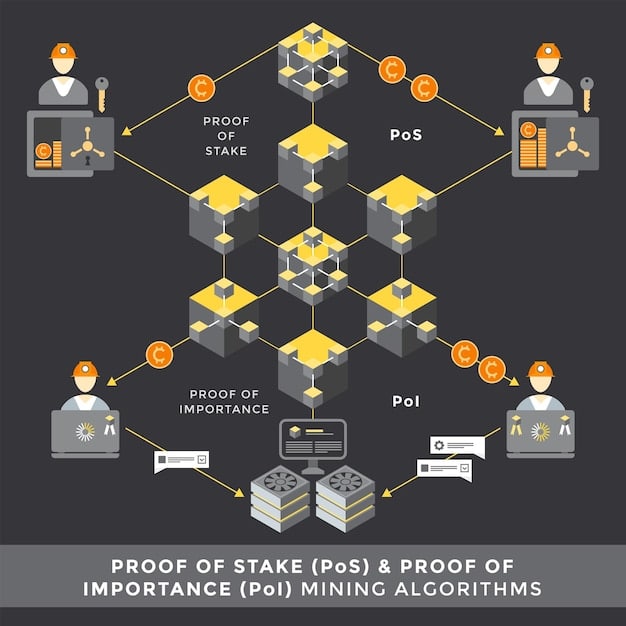Blockchain and Supply Chain: Can It Cut Fraud by 20% Next Year?

Blockchain technology is revolutionizing supply chain management by enhancing transparency and security, potentially reducing fraud by 20% within the next year through its immutable ledger system and smart contract capabilities.
Is blockchain the silver bullet for supply chain fraud? The Impact of Blockchain on Supply Chain Management: Can It Reduce Fraud by 20% in the Next Year? is a question on many industry leaders’ minds, as this technology promises to revolutionize how goods are tracked, verified, and transacted.
Understanding Blockchain’s Potential in Supply Chain
Blockchain’s impact on supply chain management is becoming increasingly apparent, offering solutions to long-standing issues of fraud and inefficiency. Its decentralized and transparent nature provides unparalleled opportunities for tracking products, verifying authenticity, and streamlining operations.
Enhanced Transparency and Traceability
One of the most significant advantages of blockchain is its ability to provide end-to-end visibility within the supply chain. Every transaction, from the origin of raw materials to the delivery of finished goods, can be recorded on the blockchain, creating a permanent and tamper-proof record.
Immutable Ledger System
The immutability of blockchain ensures that once data is recorded, it cannot be altered or deleted, making it difficult for fraudulent activities to go unnoticed. This feature is crucial for maintaining the integrity of the supply chain and building trust among stakeholders.
- Improved product tracking and tracing.
- Reduced counterfeit goods entering the market.
- Enhanced compliance with regulatory requirements.
In conclusion, blockchain’s potential to enhance transparency and traceability in the supply chain is undeniable. By providing a secure and immutable platform for recording transactions, it can significantly reduce inefficiencies and combat fraud, paving the way for a more trustworthy and reliable supply chain ecosystem.
The Current State of Supply Chain Fraud
Supply chain fraud is a pervasive issue affecting businesses across various industries, resulting in significant financial losses and reputational damage. Understanding the current landscape of supply chain fraud is essential for developing effective strategies to mitigate its impact.

Common Types of Supply Chain Fraud
Supply chain fraud can manifest in many forms, including counterfeit goods, cargo theft, and false documentation. These fraudulent activities not only disrupt the flow of goods but also pose serious risks to consumers and businesses alike.
Global Impact of Fraud
The impact of supply chain fraud extends beyond financial losses, affecting brand reputation, consumer confidence, and overall market stability. Businesses that fall victim to fraud may experience decreased sales, increased costs, and damage to their relationships with suppliers and customers.
- Financial losses due to counterfeit goods.
- Operational disruptions caused by cargo theft.
- Erosion of trust among stakeholders.
In sum, understanding the current state of supply chain fraud is paramount for developing effective countermeasures. Implementing blockchain technology can offer a strong defense against common types of fraud, helping businesses protect their bottom line and maintain their reputation.
How Blockchain Can Reduce Fraud by 20%
Blockchain technology holds the potential to significantly reduce fraud in supply chain management. Its unique features provide a secure and transparent platform for tracking goods, verifying authenticity, and streamlining operations, which could lead to a 20% reduction in fraud within the next year.
Benefits of Blockchain in Fraud Prevention
Blockchain’s decentralized nature and immutable ledger system make it difficult for fraudulent activities to go unnoticed. By providing end-to-end visibility and traceability, it can help businesses identify and prevent fraud at every stage of the supply chain.
Real-World Examples and Case Studies
Several companies have already implemented blockchain technology to combat fraud in their supply chains, with promising results. These real-world examples and case studies serve as evidence of blockchain’s effectiveness in fraud prevention.
With these benefits in mind, let’s look at some specific examples.
- IBM Food Trust: Tracking food products from farm to table, ensuring safety and authenticity.
- Walmart’s blockchain pilot: Enhancing traceability of mangoes, reducing the time to trace a product from days to seconds.
- De Beers’ Tracr platform: Tracking diamonds from mine to retail, ensuring ethical sourcing and preventing the entry of conflict diamonds into the market.
In conclusion, the integration of blockchain technology can lead to a notable reduction in supply chain fraud. The ability to track goods and see an immutable chain of history increases accountability and transparency in a supply chain. This results to a more secure supply chain and protects businesses and costumers.

Challenges and Limitations of Blockchain Implementation
While blockchain offers numerous benefits for supply chain management, it also presents several challenges and limitations that businesses must address before implementation. Understanding these challenges is crucial for successful integration and maximizing the technology’s potential.
Scalability Issues
One of the primary challenges of blockchain is its scalability. As the number of transactions increases, the network can become congested, resulting in slower processing times and higher transaction fees.
Integration with Existing Systems
Integrating blockchain with existing supply chain systems can be complex and costly. Many businesses rely on legacy systems that are not compatible with blockchain technology, requiring significant modifications or replacements.
- High initial investment costs.
- Lack of industry standards and interoperability.
- Regulatory uncertainty and legal considerations.
To summarize, businesses must carefully evaluate the challenges and limitations of blockchain implementation before embarking on this journey. Addressing these challenges proactively will increase the likelihood of successful integration and ensure that the technology delivers its intended benefits.
Future Trends in Blockchain and Supply Chain Management
The future of blockchain and supply chain management is promising, with several emerging trends set to shape the industry in the coming years. Staying abreast of these trends is crucial for businesses looking to leverage blockchain technology to its full potential.
Expansion of Smart Contracts
Smart contracts are self-executing agreements written into the blockchain, automating various processes and reducing the need for intermediaries. The expansion of smart contracts will further streamline supply chain operations and enhance efficiency.
Integration with IoT Devices
The integration of blockchain with Internet of Things (IoT) devices will enable real-time tracking and monitoring of goods throughout the supply chain. This combination will provide greater visibility and control, reducing the risk of fraud and inefficiencies.
- Increased adoption of decentralized finance (DeFi) solutions.
- Development of blockchain-based supply chain finance platforms.
- Growing focus on sustainability and ethical sourcing using blockchain.
In conclusion, the future of blockchain in supply chain management is bright, with numerous opportunities for businesses to innovate and improve their operations. By staying informed about emerging trends and embracing new technologies, businesses can unlock the full potential of blockchain and gain a competitive edge and bring more accountability into the supply chain.
Measuring the Success of Blockchain Implementation
Measuring the success of blockchain implementation in supply chain management requires careful planning and the use of appropriate metrics. By tracking key performance indicators (KPIs), businesses can assess the effectiveness of their blockchain initiatives and make data-driven decisions.
Key Performance Indicators (KPIs)
Several KPIs can be used to measure the success of blockchain implementation, including reduced fraud rates, improved traceability, and increased efficiency. These metrics provide valuable insights into the technology’s impact on the supply chain.
Tools for Data Collection and Analysis
Various tools and technologies can be used to collect and analyze data related to blockchain implementation. These tools help businesses monitor their KPIs and identify areas for improvement.
- Track reduction in counterfeit incidents.
- Measure improvements in product recall times.
- Assess customer satisfaction levels.
To summarize, measuring the success of blockchain implementation is essential for maximizing the technology’s potential and driving continuous improvement. By tracking relevant KPIs and using appropriate data analysis tools, businesses can ensure that their blockchain initiatives deliver tangible results and contribute to the overall success of their supply chain operations.
| Key Aspect | Brief Description |
|---|---|
| 🔍 Transparency | Blockchain enhances supply chain transparency by recording every transaction in an immutable ledger. |
| 🛡️ Fraud Reduction | By providing end-to-end visibility, blockchain can significantly reduce fraud and counterfeit goods in the supply chain. |
| 🚀 Efficiency | Smart contracts and automated processes can streamline supply chain operations, reducing costs and improving efficiency. |
| 🌐 Integration | Integrating blockchain with IoT devices enables real-time tracking and monitoring of goods, enhancing security and control. |
Frequently Asked Questions
▼
Blockchain technology is a decentralized and immutable ledger system that records transactions across multiple computers. It provides transparency and security, making it ideal for supply chain management.
▼
Blockchain reduces fraud by providing end-to-end visibility and traceability. Every transaction is recorded on the blockchain, making it difficult for fraudulent activities to go unnoticed.
▼
Challenges include scalability issues, integration with existing systems, high initial investment costs, and regulatory uncertainty. Businesses must address these proactively.
▼
Smart contracts are self-executing agreements written into the blockchain. They automate processes and reduce the need for intermediaries, streamlining supply chain operations.
▼
Businesses can measure success by tracking KPIs such as reduced fraud rates, improved traceability, and increased efficiency. Data collection and analysis tools can help monitor these metrics.
Conclusion
In conclusion, the potential of blockchain technology to transform supply chain management and reduce fraud is substantial. While challenges exist, the benefits of improved transparency, security, and efficiency make it a worthwhile investment for businesses seeking to enhance their supply chain operations and protect their bottom line.





